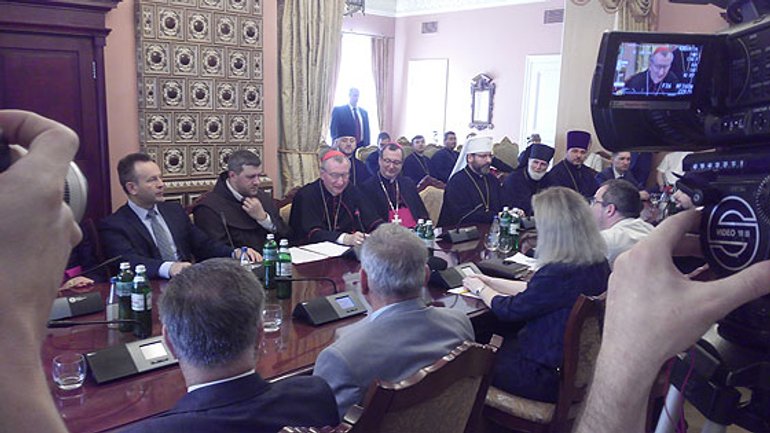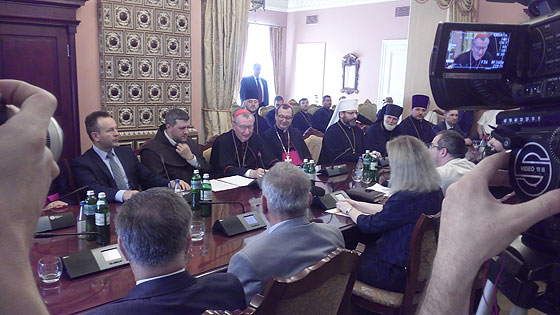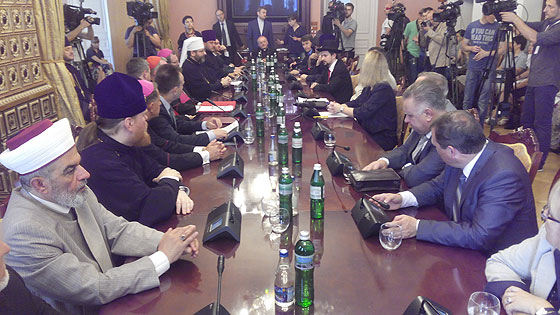Cardinal Parolin: I saw Christian culture, dialogue and brotherly solidarity in Ukraine

The visit of the Vatican’s Secretary of State Cardinal Pietro Parolin was concluded with a meeting with the All-Ukrainian Council of Churches and Religious Organizations held on June 20 in metropolitan chambers of St Sophia. The Vatican guest shared his impressions of the visit to Ukraine, and members AUCCRO remembered how they met with Pope John Paul II 15 years ago.

In a speech to AUCCRO members, Cardinal Parolin noted the importance of this organization for Ukrainian religious life. The archbishop pointed out that in the times of the baptism of Kyiv there was the unity and communion between Rome and Constantinople. “That event is a kind of archetype, which is not just recalled in memory, but from which we draw inspiration to understand: if this was our past, why it cannot be our future, in the restored fidelity to the commandments of Christ “that all may be one”?"
The cardinal recalled that in the last century Ukrainian people became martyrs who endured the madness of Nazism and Communism, famine and turmoil of the Chernobyl disaster.
“The Ukrainian people still suffer from bombing, destruction of villages and infrastructure, and primarily from the return of hatred and mistrust that are destabilizing the society, which makes all efforts to gain the opportunity to equally enjoy the various gifts that the Creator has bestowed upon them,” the Vatican’s Secretary of State noted.
“At this time of outstanding difficulties, aggravated by the load of institutional, financial and moral crisis, which inflicts great suffering – we, the religious community, are called to the unprecedented responsibility,” the Cardinal said. He assured that common service of all those who believe in God to those in need will help everyone feel brothers again.
“This is our day, brothers; the time for which we are responsible. For neither politics nor wealth, nor mutual disputes can make us true disciples of the Creator. We will become true through the spirit of service and trust to us, which comes from the fact that we have no other purpose than serving the common good,” the Vatican’s Secretary of State noted, speaking to AUCCRO members. “For a believer, nothing can justify hatred, slander, rejection of one’s brother. It is even less possible to justify using the name of God. This is blasphemy: refer to God as the One who produces division and death.”

The Vatican’s guest also said that the striving of Ukrainian youth for justice, fighting corruption, abuse of power and lack of opportunities can be based on Christian culture, which is rooted in the Ukrainian land. “This culture continues to inspire when we first become its witnesses. Our debate and our opposition in the name of the past forgotten by everyone except for our stubborn resentment do not help us to be the followers of that truth which makes us free. Your young people are seeking for integrity, consistency, respect and want to see it first in us and through us. If we can give it to them – they will be saved and will save Ukraine,” the Cardinal said.
At the end of his speech, he said that the entire Catholic Church, which raised funds to help Ukraine, wanted to take actual steps towards peace in Ukraine and solidarity with the victims of war in eastern Ukraine.
In turn, all members of the Ukrainian Council of Churches and Religious Organizations mentioned the visit of St. John Paul II in Ukraine and invited the current pontificate to come to Ukraine. Head of the UGCC Patriarch Sviatoslav said that His Eminence Lubomyr (Husar) often recalled the words of Pope John Paul II, who was impressed by meeting with AUCCRO members and called Ukraine the “laboratory of ecumenism.”
Archbishop Yevstratii (Zoria), the representative of the UOC-KP, conveyed greetings from Patriarch Filaret and also recalled the words of John Paul II that after long ecumenical theological discussions the time came for common protection of morals, family, and human dignity, that AUCCRO is actually engaged in. “We remain different, but talk about one and the same thing.”
Sheikh Ahmad Tamim spoke on behalf of the Muslims of Ukraine. Hennadiy Bilorytskyy thanked on behalf of the Chief Rabbi Jacob Dov Bleich for the efforts of the Catholic Church in support of the Jewish-Christian dialogue. He said: “We need peace, but not at any price. Not at the cost of Ukrainians because we have already paid a high price.”
In turn, Archpriest Mykolai Danylevych, spokesman for the Ukrainian Orthodox Church (Moscow Patriarchate), expressed hope for the Vatican’s balanced position on Ukrainian events. He also mentioned that during the great wars the Catholic Church found itself in the situation where its congregation was on both sides of the front. Now the faithful of the UOC (MP) are on both sides of the confrontation. Like the Vatican, they stand for territorial integrity of Ukraine.
President of the Council Valeriy Antoniuk, chairperson of the Ukrainian Union of Baptist Churches, thanked the Catholic Church for the good initiative, readiness to serve Ukraine. In the follow-up to the previous speakers – the council members and representatives of the government, he invited Pope Francis to visit Ukraine again.
Expressing gratitude for this meeting, Cardinal Parolin could not withhold admiration of the Council’s work and the level of dialogue. He also called for more active joint actions relying “on the great resource that you have - the people.” The whole country is suffering, but he saw people’s solidarity, joy and desire to help each other. It is the communication with people that was the best experience of the Vatican’s guest in Ukraine.









